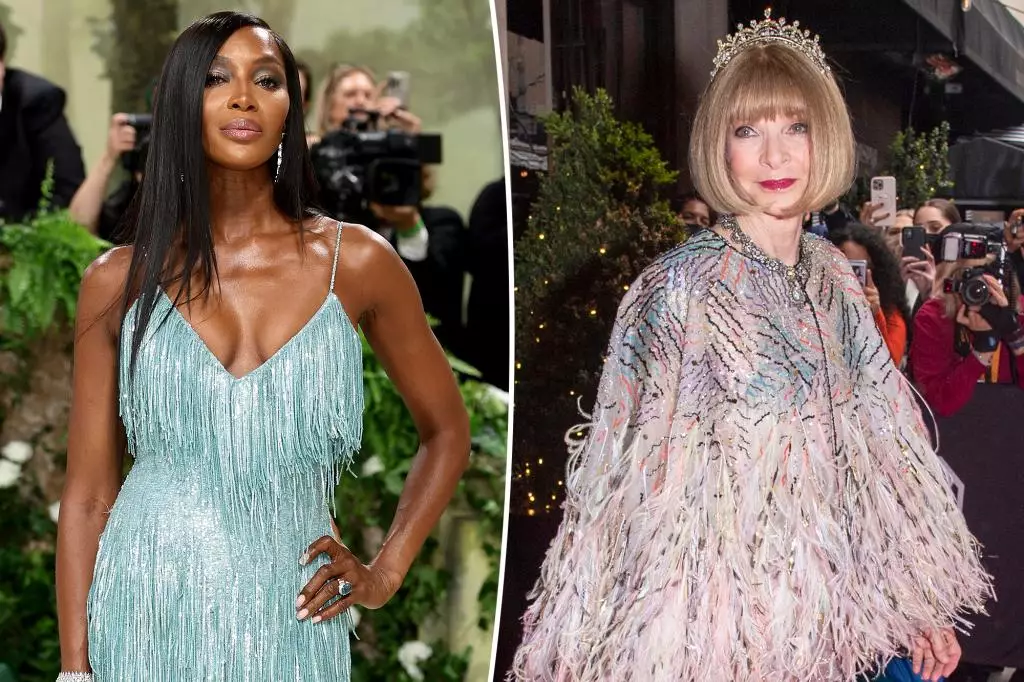The fashion world was stirred this past week when supermodel Naomi Campbell announced her decision to skip the 2025 Met Gala, igniting speculation about her relationship with the event’s powerful organizer, Anna Wintour. In an emotional Instagram post, the iconic figure congratulated Wintour and the Met Gala team for their dedication to the evening’s theme, “Superfine: Tailoring Black Style.” However, the hollow tone of her announcement and the underlying tensions between the two titans of fashion hinted at more than just a scheduling conflict.
At 54, Campbell has spent decades at the pinnacle of an industry fraught with challenges, and her absence from such a notable gala would typically be described as a personal choice. Yet, the nuances of her departure—especially given her rich history with the event—raise significant questions about unresolved conflicts. Campbell expressed her deep appreciation for the ongoing celebration of Black fashion, yet her regret for skipping the event seemed tinged with an undertone of dissent. One can’t help but wonder: Is this merely an absence, or is it a statement?
Recollections of a Complicated Past
Looking back at previous Met Galas, Campbell’s journey has been nothing short of iconic. She made her debut on the famed steps in 1990, gracing the red carpet in a stunning silver gown by Gianni Versace. Over the years, she has consistently captured attention, showcasing the evolution of fashion while also highlighting the contributions of women of color in an industry historically dominated by white voices.
This year’s theme, focusing on Black culture’s influence on style, echoes Campbell’s own journey—a struggle for recognition amid a labyrinth of stark realities. The theme not only celebrates the rich heritage of Black dandyism but also serves as a reminder of the ongoing fight for visibility and validity. It’s this intricate tapestry of race and fashion that Campbell embodies, one that makes her absence even more poignant.
It’s also worth noting the undercurrents of tension between Campbell and Wintour, amplified by their heated exchange during a recent event. When Wintour publicly noted Campbell’s notorious lateness, it sent ripples through the industry—highlighting a relationship that could be described as both collaborative and contentious. Such dynamics beg the question: Has the Met Gala, once a platform for Campbell to express herself, become a space where her legacy is overshadowed by the industry’s old guards?
The Legacy of André Leon Talley
In her announcement, Campbell paid homage to the late André Leon Talley, a prominent force in fashion who championed diversity and creativity. By invoking Talley’s memory, Campbell not only honors a personal friendship but also emphasizes the political undertones of Black representation in fashion. His legacy looms large, and Campbell’s absence resonates with a collective cry for the recognition of those who paved the way for current and future generations.
Talley’s vision was primarily driven by an understanding that fashion is art; it’s about storytelling, identity, and rebellion. As Campbell alluded to the creativity that would unfold at the gala, one can feel her absence echoing a larger critique about who gets to shape narratives within fashion.
The Future of Fashion Events
As the Met Gala evolves, questions surrounding genuine representation remain hotly debated. Campbell’s decision to forgo the event this year raises concerns about who is welcomed and what narratives are being prioritized. Are fashion events becoming echo chambers, disengaged from the cultural shifts happening outside their gilded walls? Campbell’s departure is not just about her personal choice; it’s indicative of a larger dialogue around inclusivity and the power dynamics within the fashion realm.
In an industry that often thrives on spectacle, Campbell’s absence could serve as a wake-up call for organizers to reflect on who is invited to share the stage and whose voices are amplified. The Met Gala must evolve beyond mere themes; it needs to confront the sentiments of those it commemorates—especially those who have for so long been relegated to the sidelines.
As the dust settles on this year’s gala, one thing is clear: Naomi Campbell’s absence is a potent reminder of the complex tapestry of relationships in the world of fashion.

